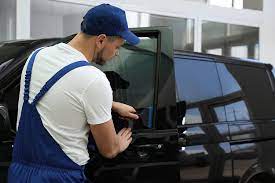Windows play an integral role in our homes, Newark towing company offices, and vehicles, providing natural light, a view of the outdoors, and ventilation. However, they also expose us to various elements, such as excessive sunlight, harmful UV rays, prying eyes, and even security risks. To address these concerns, tinted windows have emerged as a practical solution, offering an array of benefits that cater to both practical and aesthetic needs.
Tinting involves applying a thin, transparent film to the interior or exterior of windows. This film is composed of polyester layers infused with dyes and metallic particles that help regulate light transmission, reduce heat, and enhance privacy without obstructing the view. The degree of tint can vary, providing options ranging from barely noticeable light filtering to darker shades for increased privacy and UV protection.
One of the primary advantages of tinted windows is their ability to mitigate the effects of sunlight. These films significantly reduce the amount of heat that enters a space, which can be especially beneficial in hot climates or during scorching summers. By minimizing heat gain, tinted windows can contribute to lower energy consumption by reducing the need for excessive air conditioning, thereby potentially decreasing utility bills.
Moreover, these films act as a shield against harmful UV rays. Prolonged exposure to UV radiation can cause fading of furniture, flooring, and upholstery, as well as contribute to skin damage and increase the risk of skin cancer. Tinted windows can block up to 99% of UV rays, safeguarding both occupants and interior furnishings from these detrimental effects.
Privacy is another key factor that tinted windows address. In residential and commercial settings, they offer a level of seclusion by preventing outsiders from easily peering inside, allowing individuals to enjoy their personal space without compromising on natural light. This feature is particularly valuable in urban environments or places where buildings are closely situated.
Furthermore, tinted windows can enhance safety and security. The film strengthens the glass, making it more resistant to shattering. In the event of an accident or attempted break-in, the film holds shattered glass together, reducing the risk of injury from flying shards and acting as a deterrent against forced entry.
